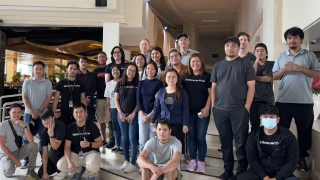- / Contents
- / Emptiness Within: A Silent Struggle

Emptiness Within: A Silent Struggle
The passage explores a profound emotional void where feelings lose their meaning, leaving one disconnected, questioning purpose, and adrift in uncertainty, despite outward expressions of emotion; it suggests introspection, self-care, and acceptance as potential ways to navigate through the emptiness.
There exists a subtle yet profound void that many experience—a space where emotions, once vibrant, seem to lose their meaning. This void is not merely an absence
of feeling but a quiet erosion of significance. It creeps in unannounced, often in moments of joy or excitement, casting a shadow of doubt over what was once certain.
The result is a sense of floating in an endless, dark expanse where the boundaries of purpose and meaning blur, leaving one to question the very essence of their emotional existence—or at least, that’s how it feels for me.
Have you ever felt disconnected from yourself, unsure of who you are, with no clear goals, and sometimes living without a sense of purpose? Many of us carry within our hearts a vague sense of something missing, an unnameable feeling of uncertainty. Often, we mistake it for sadness, melancholy, or boredom. But perhaps, it's not just a fleeting emotion—it's the same void that quietly erodes meaning from our lives. It lingers beneath the surface, pulling us away from our emotions until we're left questioning whether anything we feel truly matters. This uncertainty then grows, creating a persistent sense of nothingness that shadows our every emotion, leaving us adrift in a sea of doubt.
Lately, I've been navigating a complex landscape of emotions—or perhaps, the lack thereof. On the surface, I seem capable of expressing what most would consider the full range of human feelings. I can laugh at a joke, show empathy towards someone in need, feel sadness, and anger, or even shed tears. But beneath this facade, there's a persistent undercurrent that pulls me away from these emotions, leaving me with a sense of nothingness.
It's as if, no matter what I feel in the moment, there's a force within me that eventually strips away the significance of it all. For instance, I might feel a spark of excitement, but it quickly fades as I question its purpose. Does it really matter or why does it matter? The excitement dissipates, leaving behind a void—a hollow space where meaning once resided.
This void feels like floating in a dark, endless expanse, where nothing truly matters. It's not numbness in the conventional sense, but rather an awareness that, at the end of the day, everything I feel seems to dissolve into nothingness. It's a silent struggle, one that leaves me adrift, searching for an anchor in a sea of uncertainty.
In the vast expanse of human experience, feelings of emptiness are not uncommon. They serve as a reminder that our emotions, while powerful, are often fleeting and subject to deeper questions of purpose. This journey through the void, though challenging, offers an opportunity for introspection. It invites us to explore the roots of our emotions and to seek out meaning in the seemingly meaningless. The struggle itself is a testament to our search for purpose—a search that, while it may lead us through dark spaces, ultimately brings us closer to understanding the intricacies of our own minds and hearts.
Navigating through this void doesn’t have to be a solitary journey. Here are some tips I’ve read that might help in easing the feelings of emptiness:
Practice Self-Care: Engaging in daily self-care, such as eating nutritious meals, getting enough sleep, and exercising, can improve your overall well-being. Consider finding positive outlets for your emotions, like journaling or exploring a new hobby. Mindfulness and yoga can also help in reducing feelings of emptiness by grounding you in the present moment.
Explore Your Current Feelings: Take time each day to sit with your feelings and explore them. This might include setting a timer for a few minutes to notice and name
your current emotions or sensations in your body. Practicing this regularly can lead to deeper self-awareness and help address the underlying causes of emptiness.
Acceptance: Acceptance involves fully experiencing your emotions and thoughts without trying to change or escape them. By acknowledging and observing your feelings with openness, you can reduce avoidance and gain a clearer understanding of your emotional state, helping to manage the experience of emptiness more effectively.
Letting Go: By practicing non-attachment, you can give equal attention to all stimuli and avoid being trapped by negative aspects of your experience. This helps in
managing feelings of emptiness by allowing you to engage with your experience without clinging to or distancing yourself from it.
These tips may sound very effective, but as often noted, those who give advice are sometimes the ones who struggle to apply it themselves. This applies to me as well, as I navigate my own journey through emptiness. After writing all this and reflecting on my current situation, I’m left wondering: what do I truly feel? The answer, it seems, remains uncertain.
Reference:
https://www.researchgate.net/publication/226151614_Mindfulness_and_Feelings_of_Emptiness













